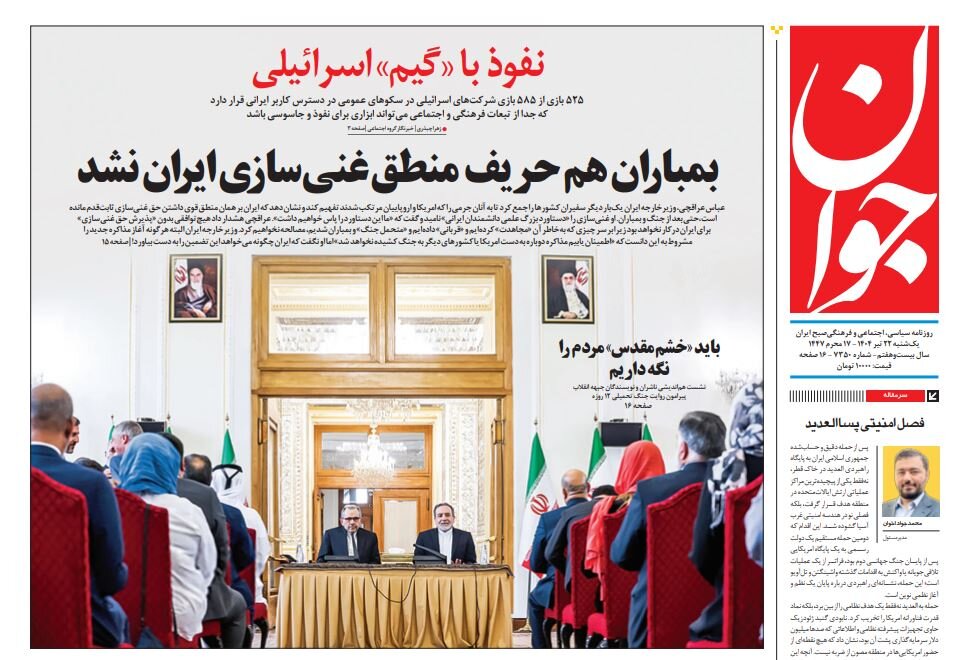The post-Al-Udeid security season

TEHRAN - Javan devoted its editorial to the Islamic Republic of Iran's precise and calculated attack on the United States’ strategic Al-Udeid airbase in Qatar.
The paper said: This attack not only targeted one of the most complex operational centers of the U.S. military in the region, but also opened a new chapter in the security geometry of West Asia. This attack is a strategic sign of the end of an order and the beginning of a new order, and is considered a turning point in the strategic discourse of the resistance. On the one side, this development is a sign of the Islamic Republic’s increased self-confidence in terms of defense, and on the other, it is evidence of the Axis of Resistance’s promotion from a reactive level to an aggressive, effective, and independent level. In this new order, the power structure changes from unipolar to indigenous multipolarity; its ideological foundations are rooted in Islamic identity, and its security tool is designed based on asymmetric, mobile, and indigenous deterrence. The ultimate success of this order requires the transformation of military deterrence into effective defensive diplomacy and the provision of a model for the security cooperation of the countries in the region. The future of West Asia is in the hands of the will of the nations that have overcome foreign domination and are on the path to achieving true independence.
Etemad: Extremism is the enemy of national unity
In an interview with political analyst and former parliamentarian Heshmatollah Falahatpisheh, Etemad examined the danger of extremism in the post-war political atmosphere. Falahatpisheh said: While the vast majority of analysts and political activists in the post-war period called for an increase in patriotic and national approaches to protect the achievements of the people and the government in the 12-day war, immediately after the ceasefire, extremists became active to strike and obstruct the government's activities. The extremists have put several programs on the agenda in the post-war period; their most important strategy is to confront any kind of diplomatic movement. Therefore, when the Iranian President issued a message of peace, de-escalation, and diplomacy in an interview with an American journalist (Tucker Carlson), they quickly attacked him. In the next stage, the extremists raised money to assassinate Trump. The extremists are trying to cause costs for the country and the people by using Iran’s name to assassinate Trump. These groups are obstructing the president’s reasonable policies for negotiations. If the government does not stop these groups, they will cause more damage to the country.
Siasat-e-Rooz: The West is not trustworthy
In light of discussions about Iran's potential return to nuclear negotiations with the United States, it is imperative to recall the history of betrayal that undermined past efforts. Negotiations should not proceed on the vague hope of non-aggression. Instead, the foundation must be an official and globally recognized declaration acknowledging that the United States and the Zionist regime have carried out attacks against Iran. These aggressors must be held accountable and required to pay reparations for the damage inflicted.
Only after such compensation is addressed, and with binding international guarantees preventing future hostilities, can meaningful dialogue resume—including discussions on Iran’s legitimate nuclear rights. Any negotiated solution must unambiguously respect the rights of the Iranian people, particularly the right to nuclear enrichment. However, recognition of these rights must be coupled with clarity around the obligations of those responsible for previous aggressions.
It is vital to remember: the West’s agenda has long aimed to destabilize Iran, echoing the tragic fate of Libya. The only effective countermeasure is a strategic strengthening of Iran’s military, economic, and security sectors, rooted in national unity and powered by domestic resources.
Arman-e-Emrooz: Agreement at any cost is unlikely
In a note, Arman-e-Emrooz discussed Netanyahu's visit to the White House and his meetings with Trump. It wrote: Netanyahu and Trump's talks showed the contradictory calculations that the three sides have been facing since the Israeli and American attacks on Iran's nuclear facilities. Trump is counting on the threat of more attacks to force Tehran to agree to a deal that would prevent Iran from allegedly building a nuclear weapon. However, Israel doubts that a diplomatic solution will prevent Iran's secret progress towards a nuclear weapon. Tehran is seeking guarantees that Iran will not be attacked again in exchange for resuming talks with Washington. Western diplomats believe that Iran is still discussing next steps and how to address this issue. According to Ali Vaez from the Crisis Group think tank, there is now greater distrust of Trump and concerns that he will change tact. Attempts to reach an agreement at any cost, including an agreement that would end uranium enrichment in Iran, are unlikely.
Leave a Comment